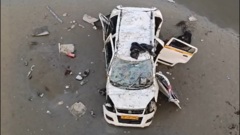In a shocking incident in northern India, three men lost their lives when their car plummeted off an incomplete bridge into a riverbed while en route to a wedding. The accident, which occurred in Uttar Pradesh, is under investigation by police who suspect that Google Maps directed the men onto the dangerous route. The bridge had been damaged by floods earlier in the year, and while local residents knew to avoid it, the victims, unfamiliar with the area, did not.
Local authorities have filed a complaint against several engineers and an unnamed official from Google Maps for culpable homicide. This case has led to widespread discussions about India's inadequate road infrastructure and the responsibility of navigation apps in ensuring user safety. Critics argue that Google Maps should deliver precise information, while others feel the government is at fault for not adequately marking the risks.
Google Maps is a prevalent navigation tool in India, boasting around 60 million users and processing 50 million searches daily. It has previously faced scrutiny for directing users to hazardous locations, resulting in fatal incidents. The technology relies on GPS data and reports from users and authorities to update road conditions, yet challenges persist in maintaining accurate and timely information, especially in a rapidly developing country like India.
Legal experts are divided over whether GPS apps can be held liable for accidents. While some assert their status as 'intermediaries' offers them protection from legal repercussions, others argue liability may be established if negligence can be demonstrated.
This tragic incident highlights the urgent need for improvements in road safety and navigation app accuracy to prevent future accidents.
Local authorities have filed a complaint against several engineers and an unnamed official from Google Maps for culpable homicide. This case has led to widespread discussions about India's inadequate road infrastructure and the responsibility of navigation apps in ensuring user safety. Critics argue that Google Maps should deliver precise information, while others feel the government is at fault for not adequately marking the risks.
Google Maps is a prevalent navigation tool in India, boasting around 60 million users and processing 50 million searches daily. It has previously faced scrutiny for directing users to hazardous locations, resulting in fatal incidents. The technology relies on GPS data and reports from users and authorities to update road conditions, yet challenges persist in maintaining accurate and timely information, especially in a rapidly developing country like India.
Legal experts are divided over whether GPS apps can be held liable for accidents. While some assert their status as 'intermediaries' offers them protection from legal repercussions, others argue liability may be established if negligence can be demonstrated.
This tragic incident highlights the urgent need for improvements in road safety and navigation app accuracy to prevent future accidents.




















